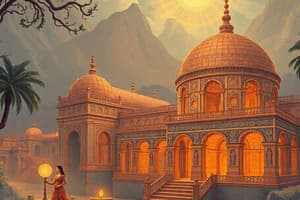Podcast
Questions and Answers
Which ancient civilization was known for developing cuneiform, one of the earliest forms of written communication?
Which ancient civilization was known for developing cuneiform, one of the earliest forms of written communication?
- Mesopotamia (correct)
- Rome
- Egypt
- Greece
What major contribution did the ancient Romans make to infrastructure?
What major contribution did the ancient Romans make to infrastructure?
- Establishing temples
- Developing pyramids
- Creating hieroglyphics
- Building aqueducts (correct)
Where was Mesopotamia located geographically?
Where was Mesopotamia located geographically?
- Along the Nile River
- Between the Tigris and Euphrates rivers (correct)
- Near the Mediterranean Sea
- In modern-day Greece
Which civilization is credited with creating hieroglyphics, an early form of writing?
Which civilization is credited with creating hieroglyphics, an early form of writing?
Which ancient civilization had city-states that were politically independent with their own government and army?
Which ancient civilization had city-states that were politically independent with their own government and army?
Which ancient civilization is considered the basis of Western civilization due to its foundational contributions in various fields?
Which ancient civilization is considered the basis of Western civilization due to its foundational contributions in various fields?
Which ancient civilization is associated with the construction of pyramids and temples?
Which ancient civilization is associated with the construction of pyramids and temples?
Which region is now part of modern Iraq and was home to civilizations like Sumer, Babylon, and Assyria?
Which region is now part of modern Iraq and was home to civilizations like Sumer, Babylon, and Assyria?
Which ancient civilization encompassed areas along both sides of the Nile River?
Which ancient civilization encompassed areas along both sides of the Nile River?
What was one of the major advancements for which ancient civilizations in Mesopotamia were known?
What was one of the major advancements for which ancient civilizations in Mesopotamia were known?
Flashcards are hidden until you start studying
Study Notes
Ancient Civilizations
Ancient civilizations refer to the advanced human societies that existed before the rise of modern states. These early cultures are considered the basis of Western civilization, as they introduced many foundational aspects of social organization, art, literature, law, philosophy, religion, politics, economics, and science. Some of the most famous ancient civilizations include Mesopotamia, Greece, Rome, Egypt, India, China, Persia, and Africa.
Mesopotamia
Mesopotamia was an ancient region located between the Tigris and Euphrates rivers, which is now part of modern Iraq. It was home to several influential civilizations, including Sumer, Akkad, Babylon, Assyria, and Chaldea. These civilizations were known for their advancements in agriculture, mathematics, astronomy, writing systems, and religious practices. They developed cuneiform, one of the earliest forms of written communication, which allowed them to record laws, trade transactions, and historical events.
Ancient Greece
Ancient Greece, located in southeastern Europe and western Asia, produced some of the world's greatest philosophers, historians, playwrights, sculptors, architects, and mathematicians. Its impact on the Western world can hardly be overestimated. Greek city-states were politically independent. Each had its own government and army, and usually its own territory. Sparta, Athens, Corinth, Thebes, Aegina, Argos, and Thespiae were among the more important. Their history was full of conflicts; these struggles between different city-states contributed much to the development of Greek culture.
Ancient Rome
The Roman Republic was founded when Romulus and Remus, according to legend, simultaneously became the first two consuls in 509 BC. As a republic, it encompassed an area from England to Spain, north Africa, and eastern Europe, covering more than ten million people. The Romans built roads, arenas, temples, arches, bathhouses, libraries, aqueducts, amphitheaters, public squares, courthouses, and sewage systems. Many city streets and neighborhoods have been transformed by urban renewal projects, while suburban expansion has produced edge cities with businesses, entertainment facilities, and housing.
Ancient Egypt
Ancient Egypt stretched along both sides of the Nile River, encompassing parts of current-day Sudan and Egypt. The country emerged from the chaos of the First Dynasty around 3100 BCE. Over centuries, the Egyptian civilization rose and fell through a series of dynasties, each contributing to the arts, sciences, architecture, technology, engineering, and medicine. The ancient Egyptians built impressive monuments like pyramids and temples, and created hieroglyphics, an early form of writing.
Other Ancient Civilizations
Other notable ancient civilizations include the Indus Valley Civilization, the Shang Dynasty, the Han Dynasty, the Xia Dynasty, the Zhou Dynasty, the Parthian Empire, and the Gupta Empire. Each of these civilizations made significant contributions to the development of human society and laid the groundwork for future civilizations.
In conclusion, understanding ancient civilizations is crucial to comprehending the evolution of human civilization and the roots of our contemporary society. Studying these past societies provides insights into how humans have lived, organized themselves, and interacted with their environments throughout history.
Studying That Suits You
Use AI to generate personalized quizzes and flashcards to suit your learning preferences.




